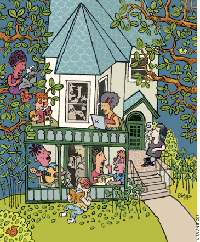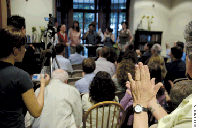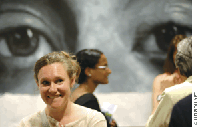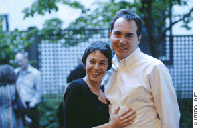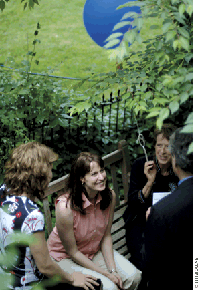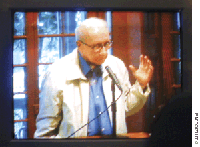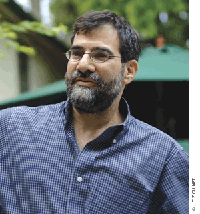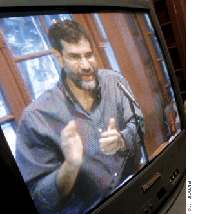The House that Writers Built
from The Pennsylvania Gazette
The House that Writers Built
July, 2006
A quiet has finally settled over Kelly Writers House.
It’s the morning after graduation, and in the garden, leftover blue balloons have drifted behind the hostas. No one is arranging hors d’oeuvres in the kitchen or setting up the mic in the Arts Cafe. No one is doing homework or debating poetics or making out on the old green couch. The chaplain’s house-turned-writers’ hub is easing into summer. Digesting, if you will, another year’s worth of stories:
Tea with Margaret Atwood. Ian Frazier eating bugs with undergrads. Quake, Penn’s first literary erotica magazine, rumbling into print. A visit by Liberian storytellers and workshops with West Philly schoolchildren. And, on May 13, scores of well-wishers gathering for the 10th anniversary of a place that faculty director Al Filreis calls “an incubator, a free space, a sandbox … for really, truly creative people,” a place where “we together changed forever the way that Penn talks and thinks about the writing arts.”
The Writers House story began in 1995 when Penn recognized, in Filreis’ words, the need to “deepen the undergraduate experience outside the curriculum,” and handed over the keys to a dusty Victorian home at 3805 Locust Walk to a group of students, faculty, and alumni interested in creating a “wacky, academically left-of-center experimental learning community.” The House would be a space where “ideas were taken seriously for their aesthetics and intellectual power, without a grade associated with it, and without a faculty member in charge of the room where you had to raise your hand.” It would be a place “where you check your academic standing or caste or position at the door.” And it would serve plenty of food (more on that later).
It was Dr. Robert Lucid, emeritus professor of English, who came up with the idea of a Writers House. “What was great about this concept and about this project was exactly the fact that, in a sense, everybody could ‘live’ here,” he observes on a CD that was put out for the 10th anniversary. “That’s somewhat of an ecclesiastical idea. You have the church, which is the house, and everybody lives there when they’re not back in their own place.” According to Lucid, Writers House has become something of a “cooperative collective,” in the spirit of the academic experiments of the 1960s.
Part of what makes the house unique is the very fact of its creation, Filreis explains. “[Penn] is the only institution I know of which is both prestigious enough to do something for an intellectually underserved constituency and could permit it organizationally” because of its decentralized nature, he says. “At most institutions, someone’s around saying, ‘That’s mine. You can’t do that,’ or ‘Why didn’t we think of that, so let’s do it in a big way. Let’s create a building and that will take 10 years, let’s have committees work on it, let’s run it through faculty governance.’” At that lumbering pace, ideas grow cold. “The Writers House is hot.”
Since its opening, Kelly Writers House has hosted appearances by more than 2,100 writers and poets, grown its staff from two to 20-something (counting work-study students), served as a model for two undergraduate hubs centered on innovation and community service (Weiss Tech House and Civic House), drawn more talented writers to Penn, and changed the lives of many aspiring wordsmiths.
One such testimonial came from Tahneer Oksman C’01, who walked out of the LSATs and gave up her law-school plans after attending a luncheon with Dorothy Allison at the Writers House. The novelist had told the group of aspiring writers about her niece “who had gotten lost in the fray,” becoming a teenage mother and serving jail time. “Dorothy Allison looked at us and said, ‘I believe there’s a book that can save everyone and someone didn’t do their job. Someone didn’t write the book that would save my niece.’ That sold me,” Oksman said. “Pretty much everything fell into place from there, and it never would have happened without that experience and the many experiences I had afterwards at the Writers House.”
From its inception Writers House has been shaped by the students, faculty, staff, and alumni who serve on its planning committee, known as “the Hub.” Through monthly meetings and an active email listserv, the large, loose-knit group generates ideas and reviews proposals about the use of the House, and has “opened the doors to other innovators,” Filreis says. But it was the provost’s and president’s offices that sponsored the house, Filreis is quick to note. “It took the central administration [saying], ‘We believe this is what Penn does best, and we’re going to help you do it.’”
Ron Daniels, Penn’s current provost, wasn’t around for the birth of Writers House (Stanley Chodorow was the provost then and Judith Rodin CW’66 Hon’04 was president), but at the anniversary celebration he lauded “the coursing energy … the passion, the aspiration” it exudes, calling it “an indispensable part of our intellectual community.
“When I’m here it gives me the sense I should leave it all behind to take up writing—give up law, give up academic administration, budgets, capital campaigns,” joked Daniels, drawing a mock protest from Filreis. “My own fantasies aside, I love the idea of the Kelly Writers House—an upstart literary hub, the product of imagination, collaboration, and volunteerism [that] has in 10 years simply become a capstone for the Penn community.”
In the early days, its prospects were much less certain, Filreis says. “It would have been easy for the medical school or Wharton or even Arts and Sciences to say, ‘We need that space. What are they contributing to the bottom line here? Nothing—they’re a bunch of writers.’”
That uncertainty did produce an aura of excitement, however. “When we first went into the Writers House, it really was a house of possibility,” recalls Shawn Walker C’96, who postponed a Thouron Fellowship to serve for a year as the first resident coordinator. (Now a midwife who writes about the politics of childbirth, she returned from Norwich, England, to attend the celebration.)
“There was wallpaper peeling off the walls, old dusty furniture, and a bunch of really excited students, faculty, and staff members,” she says. “We had so many discussions over email, [writing] the mission statement and deciding what type of program [it should be] that it became this sort of vortex of creativity. Before we knew it, there was a whole month’s worth of programming.”
Part of Walker’s job was to actually live in the house, which was patrolled by a cat named Lucid (after Bob Lucid). “The project was so all-consuming,” she explains. “I really had to be on site because I was locking the place up at three in the morning.
“Several times the budget seemed to [dry up],” she adds, “but somehow money seemed to come from somewhere, and we’d bring in another speaker or writer.”
The turning point was a significant gift from a Penn trustee and former English major, Paul Kelly C’52 WG’64, to support the renovation of the house. (The project’s architect was Harris Steinberg C’78 GAr’82.) Kelly remembers the first time he was lured there: “They had a student jazz group in the front room and brownies cooking in the back and coffee on the table. I could see what was happening, but I was a willing subject,” he says. “It had that certain combination of Greenwich Village coffeehouse and salon-like atmosphere” that he found appealing. (Though Kelly couldn’t make it to the May celebration, he sent the House a fitting anniversary gift—a new coffeemaker.)
Walker’s successor, Kerry Sherin Wright C’87, describes her first year as “wacky.” When she moved in, the renovation “wasn’t quite done.” Adding to the ambiance were student musicians whose basement practice sessions reverberated throughout the house. “My parents came to visit … and all these guys were noodling away on their jazz instruments and the dust was hanging like drapes, and I was quite harried because there was so much to do,” she says. “They laughed [and] thought, ‘She’s totally lost it.’ But they were very big supporters of the Writers House.”
Sherin Wright, who went on to become director of the House, recalls shopping for “homey” furniture with Steinberg and his wife, architect Jane Stevens GAr’82. They kept the grass-green couch that “everybody said reminded them of their grandmother’s couch. It was scratchy and when you sat on it, you went straight to the floor. That ended up being the most beloved piece of furniture in the house.”
During her seven years at the Writers House, programs sprouted up in all directions: an open mic “speakeasy,” a reading series for Penn staff, an alumni writers series [“Penn & Ink,” May/June 1999]. Sherin Wright likes to joke that if she asked Filreis whether she could “pour gasoline on this fire,” he probably would have said yes to that as well.
That sense of barely controlled chaos and what Bob Lucid has described as a kind of secular zeal continues in the former chaplain’s house. “It’s crazy, busy, wonderful,” says Dr. Jennifer Snead C’94, who’s been director since 2003 and leaves this summer to join the English department at Texas Tech University. She’ll take along memories of playing wiffle ball in the garden, cooking crepes for Pulitzer-winning author Michael Cunningham, and fielding the energetic ideas of undergraduates. “We’re all literary entrepreneurs [here],” says Snead.
The formal events “are only the tip of the iceberg,” she adds. “One of the afternoons I remember the most was [when] a group of us just photocopied an essay about American poetry and mass media and translation [on the spur of the moment] and sat in the alcove on the green couch and drank coffee and talked for about two and a half hours.”
To get the fullest flavor of Writers House, she tells people, “Hang out, do your homework here … come to meetings, and start listening in on the kinds of conversations that get struck up. Because there are just endless possibilities here.”
The Keys to the House
Dr. Robert Lucid, professor emeritus of English, reminisced at the Writers House celebration on the origins of the House:
In the fall of 1995 I noticed that Penn’s chaplain, Stanley Johnson had retired and moved out of this house. He had lived and quietly raised his family here for perhaps 30 years so that by 1995 few knew the University was maintaining a chaplain’s house. He was a very active and excellent officer, but the fact of the house was, I think, not widely known.
I went right over to College Hall and checked to make sure that the house hadn’t been assigned to another chaplain or department, because real estate at that time had started to become a serious conversation around here.
I checked with some people about the notion of a Writers House. The new president and provost, Dr. Judith Rodin and Dr. Stanley Chodorow, thought it was a good idea. In the English department, Greg Djanikian thought it was a good idea, Bob Perelman thought was a good idea, Peter Conn thought it was a good idea—but first of all we had to get the house.
Linda Koons, in the provost’s office, gave me the keys. She said, “Now if this doesn’t work, and work well, by the end of the year, you are bringing these back and we are forgetting the whole thing.”
Of course there was only one person to go to. I made Al Filreis walk with me, and I said, “Looky here,” and we walked through and I said, “What do you think of this place?” I could tell from the look on his face that he could barely contain himself.
I said, “What we’re looking for is a commitment to direct a Writers House that by the spring of ’96 will be so inviolable that we won’t have to give the keys back, and will you please do it?” He was almost fainting with desire. You all know Al, of course, so you know he didn’t say yes. He began to explain some things that he needed from me.
By the time I had finished promising him every possible thing I could beg, borrow, and steal in this world, he said, “All right I’ll do it. Give me the keys.” And that was it.
The list of visiting poets and writers stretches from Ashbery to Zizek. They don’t tell the whole story of the Writers House, but they’ve been a vital part of its programming, not to mention a rich source of house lore.
“Norman Mailer told me that I reminded him of his first wife,” Snead recalls. “I just decided I would let that one go. And John Ashbery once picked at my mashed potatoes at dinner. He said, ‘Are you eating those? Can I try that?’” Sure, she said, thinking all the while, “John Ashbery is eating off my plate!”
Some literary guests truly made themselves at home: The poet Bernadette Mayer took a nap on one of the couches. “She was all stretched out and sound asleep,” Sherin Wright recalls. “The dust was sort of hovering over her.” Another famous (and now deceased) poet took the writers’ community concept a step further, inviting Sherin Wright to share a bath with him in one of the House tubs. Sputtering, she declined—but later memorialized his proposition with a poem. “I thought, ‘I’m glad it’s me and not a student.’ That he would go for someone in her 30s was to his credit.”
The Writers House Fellows program, another project launched with support from Paul Kelly, offers a chance for readers and eminent writers to engage in conversations that go deeper than the exchanges found at a typical bookstore signing. Undergraduates taking the Writers House Fellows seminar get to spend two days with the writer.
For Filreis, it’s difficult to select the most memorable visit, but he settles on Tony Kushner, who was a fellow in 2001. “Angels in America was huge. He was sitting in this circle with 20 kids—undergraduates. And at first I think he was wary. [Wondering] ‘Where are the grad students and faculty?’”
But Filreis’ students had done their homework. “They just went to town on Kushner’s lesser work, his earlier work, and he was amazed.
“There was this one kid, a gay Republican, who was very open about his rejection of Kushner’s politics,” Filreis says. “Kushner wrote some essays about being gay, and why, inherently, gay Americans needed to be liberal … The kid was across the room from Tony, and Tony said, ‘Let’s have it out here, because I think it would be interesting’ … He was completely engaged, he started talking really fast, and the kid was doing the best he could to hold on,” Filreis says.
During a break Kushner called the sheepish student over to sit next to him, and they continued to talk. They sat together at dinner. “By the end of the evening, this kid’s politics hadn’t changed … but his life is different because … this public intellectual was serious enough to take a lot of time for him,” says Filreis. “Some version of this happens here all the time.”
I remember when …
Jamie-Lee Josselyn C’05: All of us in the 2005 Writers House Fellows Seminar were nervous about meeting E.L. Doctorow. In the four weeks leading up to his visit, we’d been challenged and awed by his novels and essays. As much as we wanted to meet him, we weren’t sure if he’d be friendly, if he’d truly understand what we were all about. At the end of Mr. Doctorow’s first day with us, a few of my friends and I were cleaning the kitchen after serving homemade sushi to a small group in the dining room. Mr. Doctorow burst through the kitchen door with a giant smile on his face. “This was wonderful!” he proclaimed. “Just wonderful!” He pointed at me: “You get an A!” Then, he pointed at Janine: “You get an A!” And then at Kerry and Phil: “You all get A’s!” I think he gave Al Filreis an A too.
Jamie-Lee Josselyn C’05 assistant to the faculty director, Kelly Writers House
David Deifer: We were still brand-new as a pilot program, we got the keys to the house and we [CrossConnect magazine] sponsored the second “live program” in the house with visiting writers. Charlottesville fiction writers Doug Lawson and David McNair came up to do a reading and discussion, share a sushi dinner afterward [that] I prepared and a brunch the following day. Al made arrangements for guests to stay the night in one of the college houses, but we didn’t have housekeeping, so after guests stayed the night, we had to go collect sheets, towels, everything, and bring them over to the Writers House to launder and then refurbish the rooms … We had to do our best to fit this into schedules as students and staff. It was as fun as it was stressful. We weren’t sure what had to be done, but as soon as tasks were identified, we pitched in and got the job done. We were doing it, we were running a program and [managing] all the details on our own. It was an empowering experience for all involved.
David Deifer, original Writers House hub member, is associate director of operations for ISC Networking and Telecommunications at Penn, and founding editor of CrossConnect (http://www.xconnect.org/), a 10-year-old literary magazine that is now endowed through its relationship with the Writers House.
Courtney Zoffness C’00: Speakeasy Open Mic made its debut in the fall of 1997—in the basement of “Chats,” a dining commons just across Locust Walk. Our first attendees were defaults: the gal working the pizza counter, a sprinkle of students trying to study in the back, a janitor. We were shameless intruders, calling out to passersby (“What, you don’t like poetry?”), littering each table with flyers, forcing our friends to attend so as to ensure that some of the seats were filled. It was only when we relocated to the newly renovated Writers House, when we plugged into a population that not only supported us, but advocated for us, that we realized how many Pennites shared our interests. In fact, in a matter of mere months, the open mic series proved so popular that we lacked enough seats to accommodate the crowd. The Kelly Writers House established a literary community at Penn that, until then, had existed only in bursts and factions around campus and around town. I am overjoyed to know that the institution and Speakeasy are going 10 years strong.
Courtney Zoffness C’00 was a fiction fellow at Johns Hopkins University and earned an MFA from the University of Arizona. She will return to Penn this fall to teach undergraduate Creative Writing.
Whatever is happening at Writers House, there’s a good chance that food will be involved. “Food is crucial because food simulates family,” says Filreis. Take the temperamentally shy John Ashbery: “If you put him in a room and said, ‘OK, now John, we’ll sit around the living room and have a conversation, he’ll sit there on the couch, unable to speak. Sit him at a table with food and wine and he gets silly and boyish and brilliant, and he can just sit back, red-faced, and listen and laugh … And you can see his poetic mind working.” To break the ice during his three-hour session with the seminar students, they served an “Ashberian snack” that included Baked Alaska and other foods found in his poems.
“For Ian Frazier, who’s also something of a shy person, we ate bugs,” Filreis reports gleefully. “We had barbecued mealworms. They were very good. And Frazier just warmed totally up.”
In honor of Susan Sontag’s visit, Snead strayed from the vegetarian traditions of the house and prepared leg of lamb, having heard that the writer was “quite the carnivore.” Then she remembered that Sontag’s novel In America contains a scene where the characters have sorrel soup at dinner. Snead contacted a chef-friend at the White Dog Café, who supplied her with organic sorrel.
Famous visitors aren’t a requisite for turning on the stove. “Sometimes people just feel like cooking and they will,” Snead says. A few years ago a group of work-study students started the tradition of making elaborate breakfasts for each other on Fridays. “We’ll all come in a little late because we’ve been working late the night before,” Snead explains. “And we’re sitting and talking and maybe people are trying to call the Writers House, but they just have to leave a message on the answering machines and we’ll get back to them later. We’re having breakfast!”
“Evil Genius.” “Force of Nature.” “Plutonium.”
The teasing metaphors that people use for Al Filreis may vary, but they all signify a phenomenal energy that powers the Writers House.
“The fact that he expects a lot from you means people feel they have a lot to give,” says Shawn Walker.
“He’s like a nuclear power source,” Sherin Wright says. “When he spies people whom he thinks have potential, he finds ways to bring it out in you.”
“No other university has an Al Filreis,” Snead contends, adding, “Everything I learned about encouraging students and having community come together, I learned from him.”
For the record, Filreis does admit to occasional fatigue. He is also the Kelly Professor of English and the founding director of Penn’s Center for Programs in Contemporary Writing, which brings Writers House together with other writing programs on campus. It helps that he loves what he does, especially working with students. “I’m taking personal responsibility to make sure this thing is always here,” he says.
As the Writers House enters its next 10 years, his goal is to “find supporters who believe in what we’re doing” and endow the program so they don’t have to raise money every year. (About 40 percent of its nearly $400,000 annual operating budget comes from the provost’s office, and this pays for facilities, maintenance, and staff salaries. The rest of the money—for actual events—comes from annual gifts, grants, and interest on the endowment for a few individual programs.)
While a national search takes place for the next Writers House director, the interim role will be filled by Jessica Lowenthal, a poet and critic who came to Penn as a doctoral student in English and has been part of the Writers House community ever since. “So she’s a natural,” Filreis says.
Though popular programs such as Speakeasy, Live at the Writers House, and Writers House Fellows will likely continue, their content will depend on the people involved with the House each year. “There’s probably going to be more non-fiction and journalism in the next couple of years than ever before because we happen to have a lot of strength in that area at the moment,” Filreis says. “But overall I think it’s clear the University is committed to it. And I’m committed to it.”
Filreis now travels around the country, recruiting students to come to Penn and join Writers House as freshmen. “This year we recruited 45 kids, and about 35 got accepted,” he says. “It’s an effective way to build a community that will last.” One of last year’s recruits, Eric Carlin C’09, created a literary magazine, The Green Couch, in his freshman year.
Bob Lucid has witnessed many changes in the local writing scene, and, on the anniversary CD, he observes, “It can’t be a coincidence, or if it is, it’s quite a coincidence, that the development and sophistication of the Writers House in a kind of microcosmic way has paralleled the development and sophistication of the University’s reputation.”
As Writers House gets “more and more on the map,” Snead says, “The hard thing is going to be keeping the mom-and-pop kind of feeling. You know, everybody’s having breakfast and no one’s answering the phone but ‘we’ll get to you in a minute,’ that kind of artsy bohemian feel. But I think that if we continue to build our community one person at a time … to get individual students, alumni, faculty, and staff engaged, we will be able to maintain that balance.”
John Fry, Penn’s former executive vice president, was so impressed with Kelly Writers House that when he left the University in 2002 to become president of Franklin & Marshall, he decided to create a similar program at his new school. That enterprise is now headed by Sherin Wright.
“I feel like we were a big flat fluffy seed that floated out from Philadelphia to Lancaster and landed and started to grow,” she says. It’s not a replica, though. “It’s a smaller community and we do things a little bit differently. We almost always have a class or curricular connection when we bring in a writer ... And students are not aligning themselves with particular aesthetics as much as really just finding out about things.”
Regardless of the focus, “I feel like there should be a Writers House on every corner,” Sherin Wright says. “It’s a way to remind people how much artists who use words reveal the world to us. It would be a more literate and more peaceful and smarter culture if we had more spaces where we acknowledged writing.”

